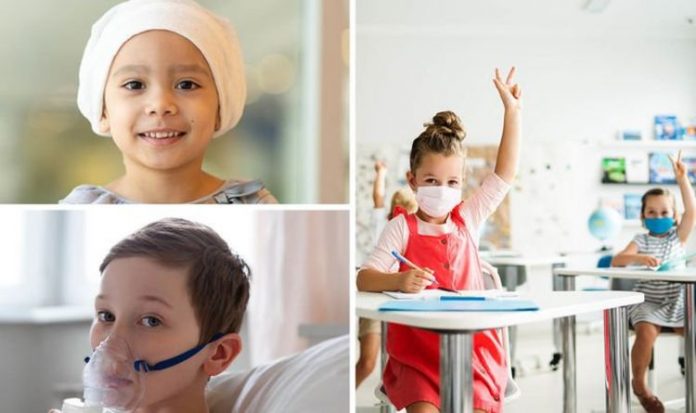The second national lockdown in England is now underway with people required to stay at home except for a list of very specific reasons. All non-essential businesses including pubs, leisure and entertainment venues must close. All household mixing indoors is banned. Schools remain open, however, but what are the rules related to extremely vulnerable children?
England is now under stricter national measures implemented in a bid to slow down the spread of coronavirus.
The new restrictions came into effect at 12.01am today (November 5) and will initially be imposed until December 2.
The new restrictions are:
- To remain at home except for childcare or education, work when you cannot work from home, exercise or outdoor recreation, shopping for essentials, medical reason, to escape injury or harm, to provide care for vulnerable people or to volunteer.
- Not mixing with different households indoors or in private gardens
- Not mixing with different households outside except for exercising or visiting a public place with one other person
- People who shield do not have to shield again but clinically vulnerable and over-60s are advised to limit their social contacts.
- All pubs, bars and restaurants must close, but takeaway and deliveries can stay open.
- All non-essential retail must close, but deliveries and click and collect are permitted.
- Essential retailers can remain open
- International travel out of the UK is banned except for work
- Avoid all non-essential travel by private and public transport
- Overnight stays and holidays are not allowed except for work.
- Support bubbles are allowed
- Children can move between homes if parents are separated
- Weddings are not allowed
- Funerals are allowed but with a maximum of 30 people.
READ MORE: UK schools closing: Will schools close on Friday?
Unlike the first lockdown in March, schools, colleges and universities will remain open during this second lockdown.
On Wednesday ahead of the second lockdown the Government issued new guidance mandating all pupils and staff at secondary schools wear masks in school corridors.
The new guidance reads: “Face coverings should be worn by adults and children aged 11 and above when moving around the premises, outside of classrooms or activity rooms, such as in corridors and communal areas where social distancing cannot easily be maintained.”
These same rules also apply to further education colleges.
The Government advice reads: “As evidence has shown there is a very low risk of children becoming very unwell from COVID-19, most children originally on the shielded patient list no longer need to be and therefore can still attend school.
“If they are unsure, parents should contact their child’s usual GP or hospital clinician to check whether they should still be considered clinically extremely vulnerable.
“If a GP or clinician has advised that a child should remain on the shielded patient list, they are advised not to attend school.
“Children who live with someone who is clinically extremely vulnerable, but aren’t themselves, should still attend school.”
Deputy Chief Medical Officer for England, Dr Jenny Harries said: “We have previously said that where the conditions of transmission of the infection alters significantly we would alert patients in relative regions.
“With the prevalence of the virus continuing to increase across England and in places across the world, it’s right that we adjust our advice for the clinically extremely vulnerable accordingly so they can feel as safe as possible over the coming few weeks.
“Our guidance for this group of individuals has always been advisory, but I would strongly urge all those who are clinically extremely vulnerable to take these extra precautions to keep themselves as safe as possible.”
The Government will be providing £32 million to upper-tier councils in England to help clinically extremely vulnerable people in the next month.
This money is intended to help adults with food deliveries, signposting for local support and befriending services.
Who is classified as clinically extremely vulnerable?
The clinically extremely vulnerable group includes people who are more at risk from serious health problems as a result of coronavirus including those with:
- Reduced immune systems
- Specific cancers
- Severe respiratory conditions
You can find the full list of those who are clinically extremely vulnerable here.
If you are unsure if you are defined as a clinically extremely vulnerable person, you should contact your doctor who should be able to offer you more specific guidance.







